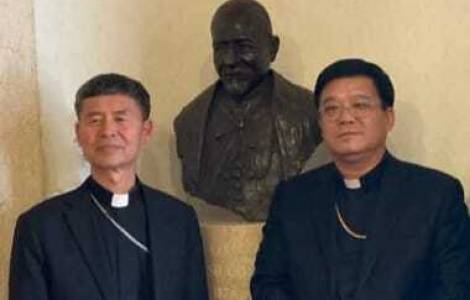
by Gianni Valente and Marta Zhao
Jining (Agenzia Fides) - The prevailing opinion among Chinese Catholics is that the current provisional Agreement between the government in Beijing and the Holy See on the appointment of Chinese Catholic bishops is "very significant and important" because "it paves the way for promoting integration and unity between the Church in China and the universal Church and facilitates the pastoral work and proclamation of the Gospel of the Church in China".
This was assured by the Bishop of Jining/Wumeng in the Chinese Autonomous Region of Inner Mongolia, Antonio Yao Shun, in an exclusive interview with Fides Agency.
Antonio Yao is one of the two Bishops from mainland China who took part in the initial phase of the work of the first Session of the XVI General Assembly of the Synod of Bishops in Rome, dedicated to the theme "For a Synodal Church: Communion, Participation, and Mission". A few weeks after the conclusion of that council session, the two Chinese Bishops agreed to answer some questions.
In the following interview, Bishop Yao points out that the first mission to which Chinese Catholics are called is to "show God's mercy and love to all other Chinese people", especially through service to people in need and suffering.
Antonio Yao Shun, 58, is the first Bishop ordained after the provisional Agreement between the Holy See and China on the appointment of Chinese bishops signed on September 22, 2018. Born in Ulanqab in 1965, Antonio Yao was ordained a priest in 1991 after studying at the National Seminary in Beijing, where he also taught and worked as spiritual director. Between 1994 and 1998 he studied in the United States and obtained a degree in Liturgy. He completed a Bible study in Jerusalem. He received his episcopal ordination on August 26, 2019 from Bishop Paul Meng Qinglu of Hohhot (Inner Mongolia). The diocese of Jining (Ulanqab) has about 70,000 believers with 30 priests and 12 religious sisters.
Bishop Yao, can you tell us with what expectations and feelings you came to Rome to participate in the Synod?
ANTONIO YAO SHUN: It was a great honor for me to participate in this important meeting. With Bishop Yang, we represented the Church in China. I was also very grateful for the invitation of the Pope. I was full of expectations.
During the Synod, you met bishops, priests, men and women of different religious orders and laypeople from all over the world. May I ask how all these participants expressed their care and support for the Chinese Church?
YAO: We were very happy to meet all these bishops, priests, men and women of different religious orders and laypeople from all over the world during the Synod. They welcomed us and showed us their respect. They were all interested in the development of the Church in China, willing to know more and pray for us.
May we ask about your personal way of faith? For example, through whom or what have you had the encounter with the Lord?
YAO: I was born in a catholic family. My parents and grandparents were very devout and faithful. It is from them that I have learned about the faith and received lots of grace of God, I think.
How did your priest's vocation come about?
YAO: I think the greatest influence on my vocation was from an old priest who has rested in peace for many years. His example as a priest, his virtues and his selfless dedication to the Church inspired me. Meanwhile, my parents' encouragement and support has further strengthened my will and determination to take the vocation of being a priest.
In this era, what do you think is the primary task for the Chinese faithful?
YAO: In my opinion, the first task for us Chinese Catholics is to show God’s mercy and love to all other Chinese. We truly care about the needs of the society, especially the needs of the poor and the suffering, and help them as much as we can.
Are there many young people and adults baptized in your diocese? What do you think make them want to be Catholics in China nowadays?
YAO: The number of young people and adults baptized in my diocese goes slightly down, but a certain number of youth and adults do get baptized. As for the reasons, I think it is because of the good examples set by the parishioners, and the care, encouragement and help given by the local church to them.
Since the Provisional Agreement between the Holy See and the People’s Republic of China was signed, it has been constantly attacked and criticized by media, especially in the West.
But what do most Chinese Catholics think?
YAO: It is generally believed that the Provisional Agreement is very meaningful and important. It paves the way for promoting integration and unity between the Church in China and the universal Church, and facilitates the pastoral and evangelic work of the Church in China. It’s also conductive to improving the Sino-Vatican relations. (Agenzia Fides, 16/11/2023)